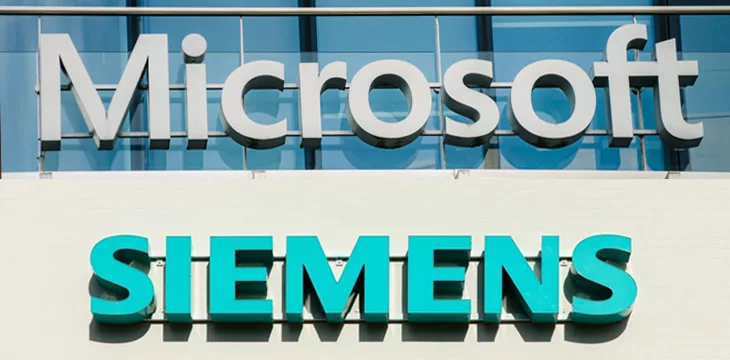|
Getting your Trinity Audio player ready...
|
German-based technology firm Siemens has teamed up with Microsoft (NASDAQ: MSFT) to roll out an artificial intelligence (AI) chatbot and improve processes in the manufacturing sector.
In a joint announcement on October 31, the AI-powered assistant, dubbed Siemens Industrial Copilot, opens a new era for “human-machine collaboration” for employees in manufacturing. The tool will shorten the time used for simulation and optimizing complex automation code from several weeks to minutes.
Employees can leverage natural language to access detailed repair instructions and simulation tools, which Microsoft says can “boost productivity and efficiency” across the industrial lifecycle. Automotive firm Schaeffler AG has integrated the AI assistant into its existing processes, citing efficiency and increased creativity as a reason for the pivot.
Although the generative AI tool is focused solely on manufacturing, Siemens and Microsoft, say future assistants will cater to the needs of the transportation, healthcare, and infrastructure sectors.
“With this next generation of AI, we have a unique opportunity to accelerate innovation across the entire industrial sector,” Microsoft Chairman and CEO Satya Nadella said. “We’re building on our longstanding collaboration with Siemens and bringing together AI advances across the Microsoft Cloud with Siemens’ industrial domain expertise to empower both frontline and knowledge workers with new, AI-powered tools.”
The partnership extends to creating a Siemens Teamcenter app for Microsoft Teams, which both entities say will be a game-changer for virtual collaboration. Scheduled for full rollout in December, the offering described to enable “industrial metaverse” will improve data accessibility for both factory and field service workers.
After a positive fiscal year that saw Siemens Group generate over €72.0 billion (US$76 billion) in revenue, the company has set its sights on generative AI in the hopes of increasing its revenue amid global macroeconomic headwinds.
“Together with Microsoft, our shared vision is to empower customers with the adoption of generative AI,” Roland Busch, CEO of Siemens AG, stated. “This has the potential to revolutionize the way companies design, develop, manufacture, and operate.”
A red-hot AI partnership streak for Microsoft
Microsoft is riding the waves of a string of positive AI partnerships in recent months, powering on with its unorthodox strategy. The big tech firm received $2 billion from professional services firm KPMG in July, with the bulk of the sum earmarked for AI research.
Not content with partnering with the private sector, Microsoft has made inroads in forging partnerships with national governments for AI adoption. In October, the company unveiled a $3.2 billion AI investment in Australia, with a portion of the sum expected to be deployed toward improving the country’s computing capacity and training 300,000 residents in AI and other emerging technologies.
In order for artificial intelligence (AI) to work right within the law and thrive in the face of growing challenges, it needs to integrate an enterprise blockchain system that ensures data input quality and ownership—allowing it to keep data safe while also guaranteeing the immutability of data. Check out CoinGeek’s coverage on this emerging tech to learn more why Enterprise blockchain will be the backbone of AI.
Watch: Turning AI into ROI

 03-02-2026
03-02-2026 




